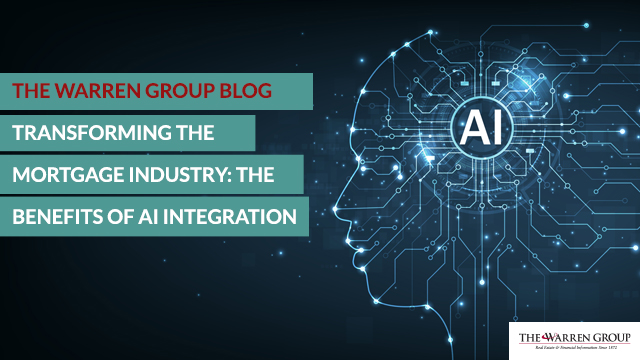In an era characterized by rapid technological advancements, the mortgage industry is undergoing a significant transformation, largely driven by the integration of Artificial Intelligence (AI) and mortgage data analytics. AI, the simulation of human intelligence processes by machines, is revolutionizing various sectors, and the mortgage industry is no exception. With its ability to process vast amounts of data, enhance decision-making, and streamline operations, AI is proving to be a game-changer that can usher in a new era of efficiency and convenience for both lenders and borrowers.
Automating and Accelerating Loan Processing
One of the most significant impacts of AI in the mortgage industry is its ability to automate and expedite the loan processing process. Traditional loan processing involves a multitude of manual tasks, from gathering and reviewing documents to verifying credit histories and calculating risk profiles. These processes can be time-consuming, prone to errors, and lead to lengthy waiting times for borrowers.
AI-powered systems can drastically reduce the time and effort required for loan processing. Through the use of Optical Character Recognition (OCR) technology, AI can swiftly extract relevant information from documents, such as tax forms and bank statements, and input them directly into the loan application. This not only accelerates the processing timeline but also minimizes the chances of human errors that might occur during manual data entry.
Enhancing Risk Assessment
Accurate risk assessment is paramount in the mortgage industry to determine a borrower’s creditworthiness and the terms of their loan. AI can analyze vast sets of data to create a comprehensive risk profile for each applicant. This profile considers factors beyond traditional credit scores, such as income stability, employment history, spending patterns, and even social media behavior. By analyzing these diverse data points, AI algorithms can provide lenders with a more holistic view of a borrower’s financial situation, reducing the risk of defaults.
Furthermore, AI’s predictive analytics can forecast market trends and potential economic changes, allowing lenders to adjust their lending criteria accordingly. This ensures that loans remain sustainable even in fluctuating economic conditions, benefiting both lenders and borrowers by fostering responsible lending practices.
Personalized Customer Experiences
In the digital age, customers expect tailored experiences that cater to their specific needs. AI-powered chatbots and virtual assistants have enabled lenders to provide personalized customer support around the clock. Borrowers can receive instant responses to their queries, from questions about the application process to inquiries about their loan status.
These AI-driven interactions are not only efficient but also provide a more engaging and user-friendly experience. Borrowers no longer need to navigate through complex websites or wait for customer service representatives to be available. Instead, they can receive real-time assistance and guidance, enhancing their overall satisfaction with the lending process.
Preventing Fraud and Ensuring Compliance
Fraudulent activities and non-compliance with regulations are persistent challenges in the mortgage industry. AI technologies, particularly machine learning algorithms, can identify patterns and anomalies within large datasets to detect potentially fraudulent applications. By analyzing historical data and comparing it to incoming applications, AI systems can flag suspicious activities, such as false income statements or identity theft attempts.
Moreover, the mortgage industry is subject to numerous regulatory frameworks that lenders must adhere to. The implementation of AI can help ensure compliance by automatically monitoring and updating processes as regulations evolve. This not only reduces the risk of costly penalties but also promotes ethical lending practices that benefit both lenders and borrowers.
The mortgage industry’s integration of AI is reshaping the way loans are processed, assessed, and serviced. Through automation, risk assessment enhancement, personalized customer experiences, and fraud prevention, AI is demonstrating its potential to revolutionize an industry that has long been characterized by complex processes and lengthy wait times. As AI continues to evolve, its benefits in the mortgage sector are poised to grow, offering a win-win situation for lenders seeking efficiency and borrowers seeking convenience. The key lies in harnessing AI’s capabilities to strike the right balance between technological innovation and the human touch, ultimately creating a more streamlined and customer-centric mortgage experience for all parties involved.


Recent Comments